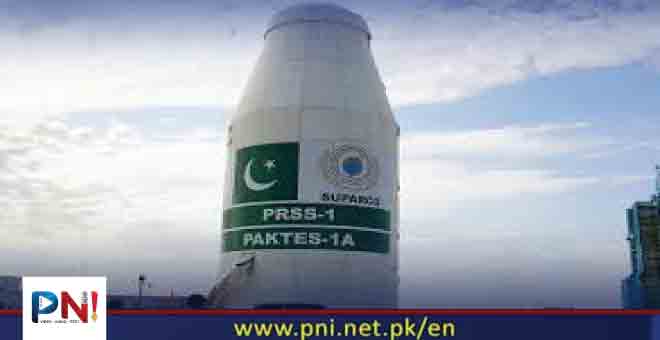BEIJING, May 12 (APP):: The ICUBE-Q satellite is the result of the first lunar exploration cooperation project between China and Pakistan which was guided by the principles of equality, mutual benefits, the peaceful utilization of space and inclusive development.
“The project will also enhance the friendship between the two countries and expand diverse cooperation in the field of aerospace,” said Ge Ping, Deputy Director of China National Space Agency (CNSA)’s Lunar Exploration and Space Engineering Center.
The collaboration was initially offered by China, expecting a student-built payload to the moon onboard the Chang’e-6 mission. A proposal by Pakistan’s IST went through the selection and started working in a collaborative effort with IST faculty and students, Pakistan’s national space agency SUPARCO and SJTU since 2023, CGTN reported.
The Chang’e-6 spacecraft, which successfully performed a near-moon braking procedure and entered the lunar orbit on May 8, is operating normally, with subsequent flight control work to be carried out as planned, said Ge.
“Both China and Pakistan attach great importance to this cooperation. During the development of the payload, government organs and scientific institutions in both countries made significant preparations,” Ge added.
“I believe that this cooperation is of great significance to promoting friendly relations between the two countries and enriching people’s understanding of the moon,” Ge noted, adding that “We will share our scientific achievements to lay the foundation for future lunar exploration activities, which will be of great significance to promoting the construction of a global community with a shared future in outer space.”
“China and Pakistan have signed a cooperation agreement on the International Lunar Research Station. China has received Pakistan’s applications for payload cooperation on the Chang’e-8 mission and for borrowing lunar samples returned by the Chang’e-5 mission. Relevant work is progressing steadily,he noted.
“We welcome Pakistan’s participation in China’s lunar and deep space exploration missions, and we will conduct extensive exchanges and cooperation related to space technology, space science and space applications to contribute to the peaceful use of outer space and serve civilization and global well-being,” Ge said.
Pakistan Ambassador to China, Khalil Hashmi said, “The launch of the Chang’e-6 mission is a model example of international cooperation in action. It demonstrated that China acts on its word, and that it undertakes meaningful cooperation and extends meaningful assistance to developing countries.”
“Pakistan’s involvement in ICUBE-Q is a testament to the fact that the country is also making progress in space exploration and technology,” he said.
“Space cooperation between China and Pakistan is a vital aspect of our bilateral relations,” Khalil Hashmi said.
“The two countries have drawn a concrete roadmap for future collaboration on space exploration, knowledge and research exchange visits, and knowledge transfers and resource-sharing,” he added.
“This mission will open up opportunities for Pakistan to explore the deep space environment and study the dynamics and geography of the moon. It will also give impetus to higher education in the space sciences in Pakistan,” said Syed Amer Ahsan Gilani, deputy director-general of the Satellite Manufacturing Department of the Pakistan Space and Upper Atmosphere Research Commission.
“Space cooperation between China and Pakistan is a vital aspect of our bilateral relations,” Khalil-ur-Rahman Hashmi said.
“The two countries have drawn a concrete roadmap for future collaboration on space exploration, knowledge and research exchange visits, and knowledge transfers and resource-sharing,” he added.
“It is just the beginning because our satellite ICUBE-Q is still far from our targeted area of the south pole of the moon, and we are anxiously waiting to receive pictures taken from a distance of up to 200 meters from the moon’s surface,” said Khurram Khurshid, the project manager of ICUBE-Q.
“About 65 to 70 students worked on different stages to build the satellite, and it was very exciting for them to receive the pictures because they worked very hard on the project and were keeping their fingers crossed for the results,” Khurshid said.
Follow the PNI Facebook page for the latest news and updates.









